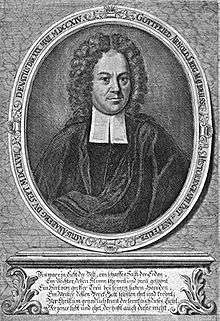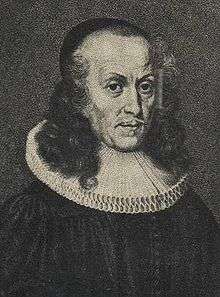Gottfried Arnold
Gottfried Arnold (5 September 1666 in Annaberg, Erzgebirge – 30 May 1714 in Perleberg) was a German Lutheran theologian and historian.

Biography
Arnold was born at Annaberg, in Saxony (Germany), where his father was schoolmaster. In 1682 he went to the Gymnasium at Gera, and three years later to the University of Wittenberg. He made a special study of theology and history, and afterwards, through the influence of Philip Jacob Spener, the father of pietism, became tutor in Quedlinburg.
His first work, Die Erste Liebe zu Christo, appeared in 1696. It went through five editions before 1728, and gained the author a high reputation. In the year after its publication he was invited to Gießen as professor of church history. He disliked academic politics and academic life so much that he resigned in 1698, and returned to Wittenberg.
The next year he began to publish his largest work, his Unparteyische Kirchen- und Ketzer-historie (“Impartial History of the Church and of Heresy,” Frankfurt, 1699–1700), two hefty volumes in which some thought he showed more sympathy towards heresy than towards any established Church, or especially the clergy (cf. Otto Pfleiderer, Development of Theology, p. 277). This book is described by Tolstoy (The Kingdom of God Is Within You, chap, iii.) as “remarkable, although little known.”
In this major revision of church history, Arnold directed his sharpest criticism against those who wrote deeply biased apologetic “orthodox” histories instead of trying to understand where substantial religious differences actually came from. In his view, “heresy making” was usually the defensive reaction of those in authority, rather than a true indictment of unconventional thinkers. He thought that the worst calamity in Church history was its establishment as the accepted and orthodox faith by the Roman Emperor Constantine in the fourth century. Arnold evinced a remarkable sympathy for a huge variety of “heretics.” This “impartial history” exercised a wide influence on the German Enlightenment and won approval from such thinkers as Johann Wolfgang Goethe in addition to Leo Tolstoy.
His next work, Geheimniss der göttlichen Sophia, showed that he had developed a form of mysticism including a female image of wisdom (sophia) as a kind of divinity. Soon afterwards, however, his marriage and his acceptance of a pastorate marked a sharp change of views, and he produced a number of noteworthy works on practical theology. He was a thoroughly learned and prominent Pietist Lutheran, with a wide range of influence, and at least in his early career a radical Pietist, vehemently opposed to the unbending ecclesiastical structures of his time.
His sacred poems also made a substantial contribution to the treasury of hymns within the Lutheran church, and a poem of his was used by Johann Sebastian Bach (“Vergiss mein nicht,” BWV 505).
Notes
References
- Peter C. Erb, Pietists, Protestants, and Mysticism: The use of late medieval spiritual texts in the work of Gottfried Arnold (1666–1714) (Pietist and Wesleyan Studies, no. 2) (Metuchen, N.J., 1989)
- Dietrich Blaufuss and Friedrich Niewöhner, eds., Gottfried Arnold (1666–1714). Mit einer Bibliographie der Arnold Literatur ab 1714 (Wiesbaden: Harrassowitz, 1995) One of the important contributions to this volume is Reinhard Breymayer: “Der wiederentdeckte Katalog zur Bibliothek Gottfried Arnolds,” pp. 55–143. Contents: scholarly articles, pp. 1–336; the inventory of Arnold's personal library taken at his death, pp. 337–410; a schematic listing of the major events in Arnold's life, pp. 411–414; and a bibliography of works on Arnold dating from 1714 to 1993, pp. 415–424.
- Werner Raupp: Arnold, Gottfried (Pseudonym: Christophorus Irenaeus), in: Biographisch-Bibliographisches Kirchenlexikon (BBKL), Vol. 20, Nordhausen: Bautz 2002 (ISBN 3-88309-091-3, Col. 46–70 (with detailed bibliography).
- Werner Raupp: Art. Arnold, Gottfried, in: Heiner F. Klemme, Manfred Kuehn (General Editors): Dictionary of Eighteenth-Century German Philosophers, Vol. 1, London/New York 2010, p. 34–36.
- Attribution

